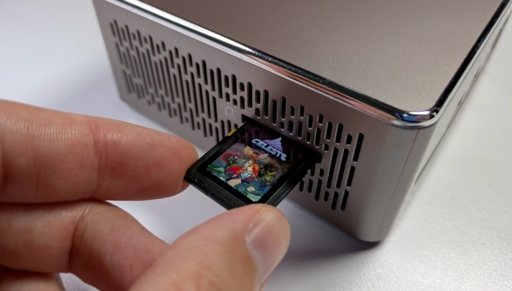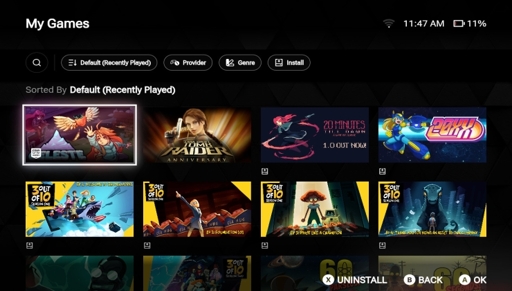- ubuntu touch UI framework / suru: qt 5 based, so slightly outdated underpinnings, but still actively maintained https://docs.ubports.com/en/latest/humanguide/index.html
- flutter: developed by google as a cross platform framework, tied to the dart programming language. https://flutter.dev/
- Canonical has created custom widgets for flutter, if you don’t like material design: https://pub.dev/packages?q=ubuntu
- uno.platform: C# framework for cross platform apps. https://platform.uno/
- 10 Posts
- 38 Comments

 21·1 month ago
21·1 month agoYou could also use dedicated hardware to store your keys. Any FIDO USB key will do. I have a Yubikey that cost me less than 30 bucks.
It’s really handy, because I frequently use someone else’s device for work. All I have to do is plug it in, press the button on the key and enter the master password for the passkey storage. It’s like having a password manager on a USB stick.

 2·1 month ago
2·1 month agoAnd they can be hardware based as well. I have a cheap Yubikey USB dongle, which works as a passkey vault as well. Completely OS independent.

 11·2 months ago
11·2 months agoBecause its not. OP made a post on Mastodon and crossposted it to Lemmy by @ing the community. I’m not sure this wasn’t by accident
I think the main problem is, that it solves a problem, that shouldn’t exist in the first place. If OEMs would build (and ideally also upstream) proper drivers, then we wouldn’t need a translation layer

 2·3 months ago
2·3 months agoYes, but is there any evidence that Moroccan Oil is an activist company? They were founded by an Israeli, but in Montreal, Canada and are headquartered in New York, USA. They don’t seem to have any direct ties to the Israeli military or government, because they are a haircare company. Companies usually care more about their bottom line than about their government’s agenda (as long as the two don’t collide)
I don’t see how this one’s involvement stops the EBU from kicking out Israel.
Isn’t the VollaPhone Quintus the best option for Ubuntu Touch? (It’s more expensive than the Fair Phone, but it ships with UT)
I’d argue that Ubuntu Touch and Sailfish are the most mature offerings. Both OSs are (or at least were at some point) developed as commercially viable alternatives to the duopoly. That gives them a headstart in terms of apps and overall pollish.
The postmarket shells are catching up, but you still get instructions like “drag and drop a file from your file manager to open it”, which doesn’t work on a phone. Phone UX still seems like an afterthought in many cases.
Postmarket OS is a desktop Linux system, but for phones. UT and Sailfish on the other hand are mobile OSs, that happen to use much of the same tech as desktop Linux. They are therefore much closer to the duopoly (for bettet or for worse).

 5·4 months ago
5·4 months agoI found pipx the easiest way to install and manage a current ytdlp installation
sudo apt install pipx pipx ensurepath pipx install yt-dlpYes I know, it’s an additional package manager, but it actually is a package manager and will therefore ensure the setup is correct

 6·4 months ago
6·4 months agoYes, but none that even comes close to Vienna in terms of size. Vienna has over 2 million inhabitants, the next city (Graz) has only 300 thousand.
Innsbruck (132000 citizens, 5th biggest city in Austria) actually also made a bid to host the contest but lost to the capital
The feature is called “WiFi Tethering” and is available on most Android systems (sometimes OEMs or carriers disable it)
On iOS it should enable automatically if you’ve got a hotspot active and connect your device to your computer via USB

 16·5 months ago
16·5 months agoThat part of the argument is slightly different. If I understand the press statement correctly, what they are saying is: “Some servers can’t, on a technical level, be hosted by the community”. And that’s not a straw man (arguing against something never asked for), that’s just a lie. We have access to all the same stuff as the industry (AWS etc). Hosting these kinds of servers might be very expensive, but the initiative only asks for a way to keep games alive not for a cheap way (though I would prefer a cheap way of course)

 37·5 months ago
37·5 months agoThat’s because it is corp. Videogames Europe is the lobbying organisation of the Euopean gaming indusry

 62·5 months ago
62·5 months agoIt’s also a strawman argument. Because yes, developers have less to no control over the operation of private servers. Yes, that means they can’t moderate those servers.
But
This initiative only covers games, not supported anymore by the devs anyway. Meaning legally speaking everything happening to private servers would be literally not their concern anymore. And new legislation, should it come to that, would spell that out.
Not necessarily. Both have their drawbacks. It takes longer for new hardware to be supported on Debian and setting up a Nvidia grafics card is more complicated

 5·6 months ago
5·6 months agoOne thing you can do: In person organising. It’s something the campaign has been really bad at. Have some flyers printed up and start handing them out. I don’t know the Italian school schedule, but if universities are still in session they might be good targets.
I did it last year, first at Gamescom and then at a local uni and I think it helped spread the word.

 2·6 months ago
2·6 months agoDistro: short for distribution. Linux is not an operating system. It’s a piece of technology (specifically something called a kernel) you can use to create an OS. Those Linux based OSs are referred to as distros. We are usually not calling them “Versions” because the Linux Kernel is also frequently seeing updates and that would just cause confusion.
Debian and Ubuntu: Popular distros. Ubuntu tends to be a bit more user friendly than Debian and was the default recommendation for new user for a long time. In recent years its popularity among enthusiasts declined because of a series of unpopular decisions, mainly the adaptation of something called snaps which is not completely open source and takes a bit more time to launch apps than alternatives. Debian on the other hand really values stability. Updates arrive less frequently than on other distros but undergo really rigorose testing.








Compose multiplatform https://www.jetbrains.com/compose-multiplatform/